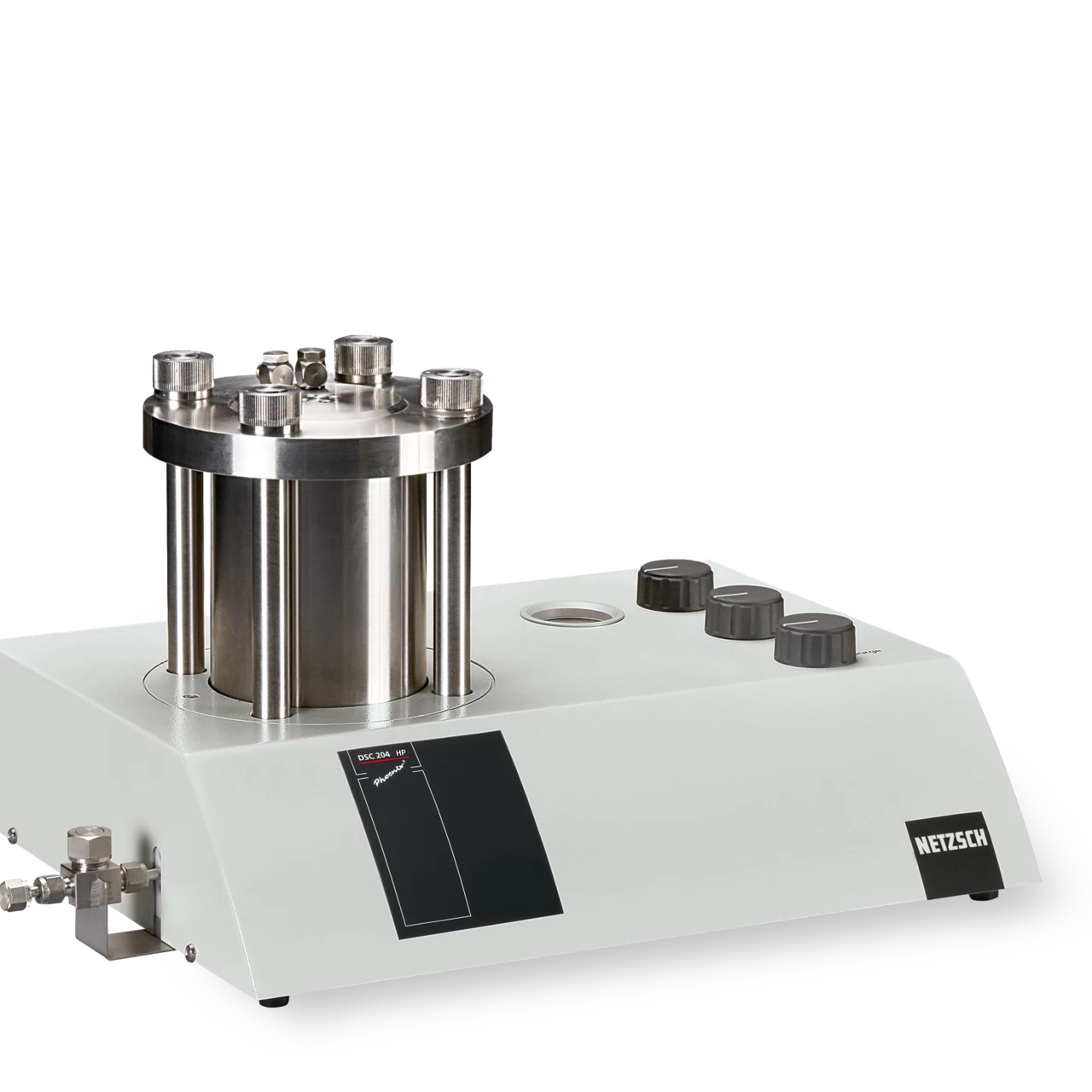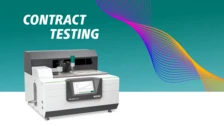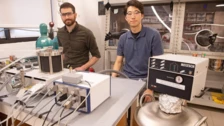Highlights
The high-pressure DSC for measurements in inert or reactive gas atmospheres
Numerous physical processes and chemical reactions are influenced by the surrounding gas pressure. In practise it is therefore often necessary to conduct DSC measurements under an increased pressure.
With the high-pressure Differential Scanning Calorimeter, DSC 204 HP Phoenix®, thermal effects in a sample can be analyzed in the pressure range from vacuum to 15 MPa (150 bar) and at temperatures from -150°C to 600°C, depending on the type of gas.
The sample chamber atmosphere can be static or dynamic. The electronic pressure monitor and control, along with exact regulation of the purge gas flow, provide for excellent accuracy and reproducibility of the measurement results.
The proven CC 200 L for liquid nitrogen cooling is available for the low-temperature range.
The safety of the high-pressure DSC system has been certified through design tests and is guaranteed during operation by the appropriate safety components.

NETZSCH Analysis Instruments at Harvard University
"We chose to work with NETZSCH’s HP-DSC because of its versatility and robustness. By allowing us to reliably access high pressures up to 150 bar with a wide range of gas environments, NETZSCH’s HP-DSC has greatly facilitated our group’s efforts to investigate Phase TransitionsThe term phase transition (or phase change) is most commonly used to describe transitions between the solid, liquid and gaseous states.phase transitions in next-generation thermal materials."
Prof. Jarad Mason - Assistant Professor of Chemistry and Chemical Biology at Mason Group at Harvard University
Method
High-Pressure Differential Scanning Calorimetry (HP-DSC)
Differential Scanning Calorimetry (DSC) allows not only for the determination of phase transformation temperatures but also for the quantification of transformation enthalpies.
A type of modified DSC, in which the measurement cell is installed in an autoclave (a "pressure DSC"), allows measurements to be carried out at pressures ranging from 5 kPa to 15 MPa (high-pressure DSC).
High-pressure DSC measurements can be performed in inert or reactive gas atmospheres. When an inert gas is used, the pressure dependence can be studied when the sample transformation (usually a caloric effect) is also accompanied by a volume change. This allows dehydration and Decomposition reactionA decomposition reaction is a thermally induced reaction of a chemical compound forming solid and/or gaseous products. decomposition reactions with gas release to be studied by pressure DSC. When a reactive gas is used, the gas becomes one of the reactants and the pressure is a measure of its concentration. This method can be used to perform aging tests on organics (such as oils, fats, waxes, greases, etc.) and polymers.

Measuring Principle of a High-Pressure DSC
In contrast to the setup of a regular DSC, the measuring cell of a high-pressure DSC (HP-DSC) is surrounded by an autoclave which is supported by pressure and gas flow control systems.
Pressure and purge gas flow are adjusted via a separate control board. With the help of liquid nitrogen cooling, it is even possible to achieve temperature programs in the subambient range.
The heating and cooling rates achieved (0.01 K/min to 100 K/min and to 50 K/min, respectively) as well as the maximum and minimum temperatures are significantly influenced by the atmosphere and pressure used.
Specifications
Technical Data
Wide pressure range
Exact pressure adjustment
Heating rates
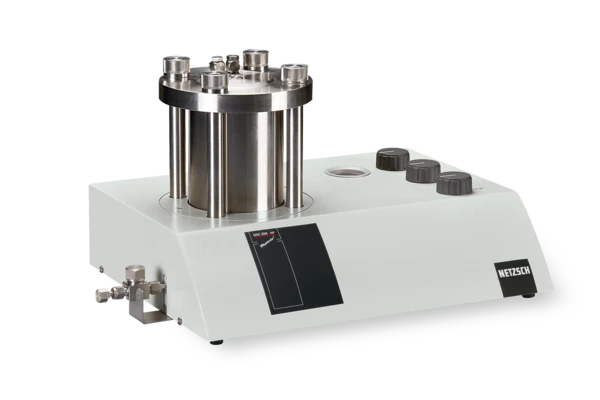
Temperature range
(depending on the gas type)
-150°C to 600°C (at 1 bar)
-90°C to 600°C (at 50 bar)
-50°C to 450°C (at 150 bar)
Measurements in different atmospheres
inert: N2, noble gases
reducing: H2
oxidizing: O2, CO2, air
Exact gas flow regulation
up to 500 ml/min
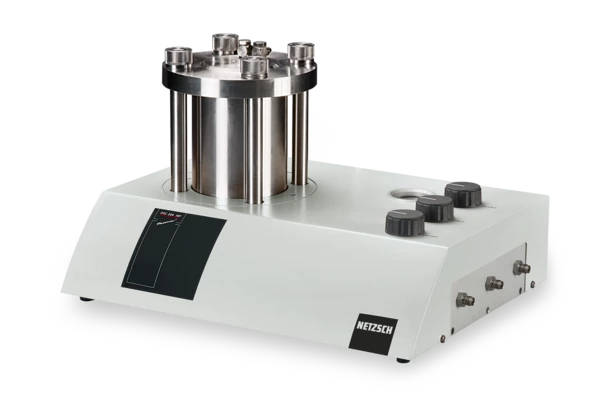
Software
Proteus®: Excellent Thermal Analysis Software
The DSC 204 HP Phoenix® runs under Proteus® Software on Windows®. The Proteus® Software includes everything you need to carry out a measurement and evaluate the resulting data. Through the combination of easy-to-understand menus and automated routines, a tool has been created that is extremely user-friendly and, at the same time, allows sophisticated analysis. The Proteus® Software is licensed with the instrument and can of course be installed on other computer systems.
DSC features:
- Determination of onset, peak, inflection and end temperatures
- Automatic peak search
- Transformation enthalpies: analysis of peak areas (enthalpies) with selectable baseline and partial peak area analysis
- Evaluation of CrystallizationCrystallization is the physical process of hardening during the formation and growth of crystals. During this process, heat of crystallization is released.crystallization
- Comprehensive Glass Transition TemperatureThe glass transition is one of the most important properties of amorphous and semi-crystalline materials, e.g., inorganic glasses, amorphous metals, polymers, pharmaceuticals and food ingredients, etc., and describes the temperature region where the mechanical properties of the materials change from hard and brittle to more soft, deformable or rubbery.glass transition analysis
- Automatic baseline correction
- Specific heat determination
- Recording and evaluation of the pressure signal

Consultancy & Sales
Do you have further questions about the instrument, the method and would you like to speak to a sales representative?
Service & Support
Do you already have an instrument and need technical support or spare parts?
Related Devices
- DSC 300 Caliris® Classic
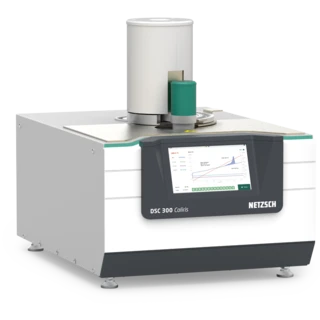
Quality assurance of polymers, food, cosmetics and organics
- Compact design for more space in the lab
- Temperature range: -170°C to 600°C
- Automatic Sample Changer: Up to 20 samples and references
- DSC 300 Caliris® Select
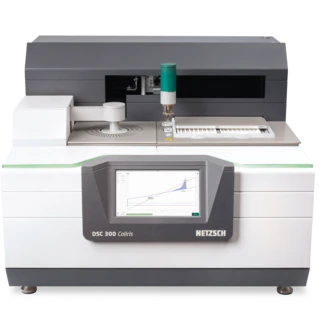
Quality assurance of polymers, food, cosmetics and organics
- Choose your appropriate module: Standard, Polymer or High-Performance
- Temperature range: -180°C to 750°C
- Automatic Sample Changer: Up to 192 + 12 samples and references
- DSC 300 Caliris® Supreme
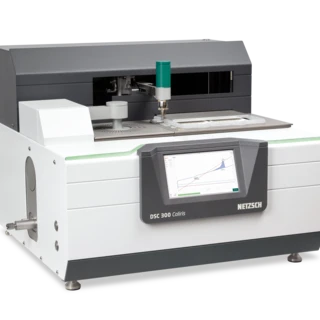
Quality assurance of polymers, food, cosmetics and organics
- Three easily interchangeable modules: Standard, Polymer and High-Performance
- Temperature range: -180°C to 750°C
- UV-Accessory: Investigate Curing Reactions with Photo-Calorimeter
Downloads and Media
Brochures
 DSC 204 HP Phoenix®Brochure(pdf – 2.02 MB)
DSC 204 HP Phoenix®Brochure(pdf – 2.02 MB) DSC 204 HP Phoenix®Data Sheet(pdf – 27 KB)
DSC 204 HP Phoenix®Data Sheet(pdf – 27 KB) Accessories for Differential Scanning Calorimeters and ThermobalancesAccessories Catalogue(pdf – 8.87 MB)
Accessories for Differential Scanning Calorimeters and ThermobalancesAccessories Catalogue(pdf – 8.87 MB) Thermal Characterization of PolymersBrochure(pdf – 4.88 MB)
Thermal Characterization of PolymersBrochure(pdf – 4.88 MB) Shape the future of paints and coatingsBrochure together with Malvern Panalytical(pdf – 1.45 MB)
Shape the future of paints and coatingsBrochure together with Malvern Panalytical(pdf – 1.45 MB)
